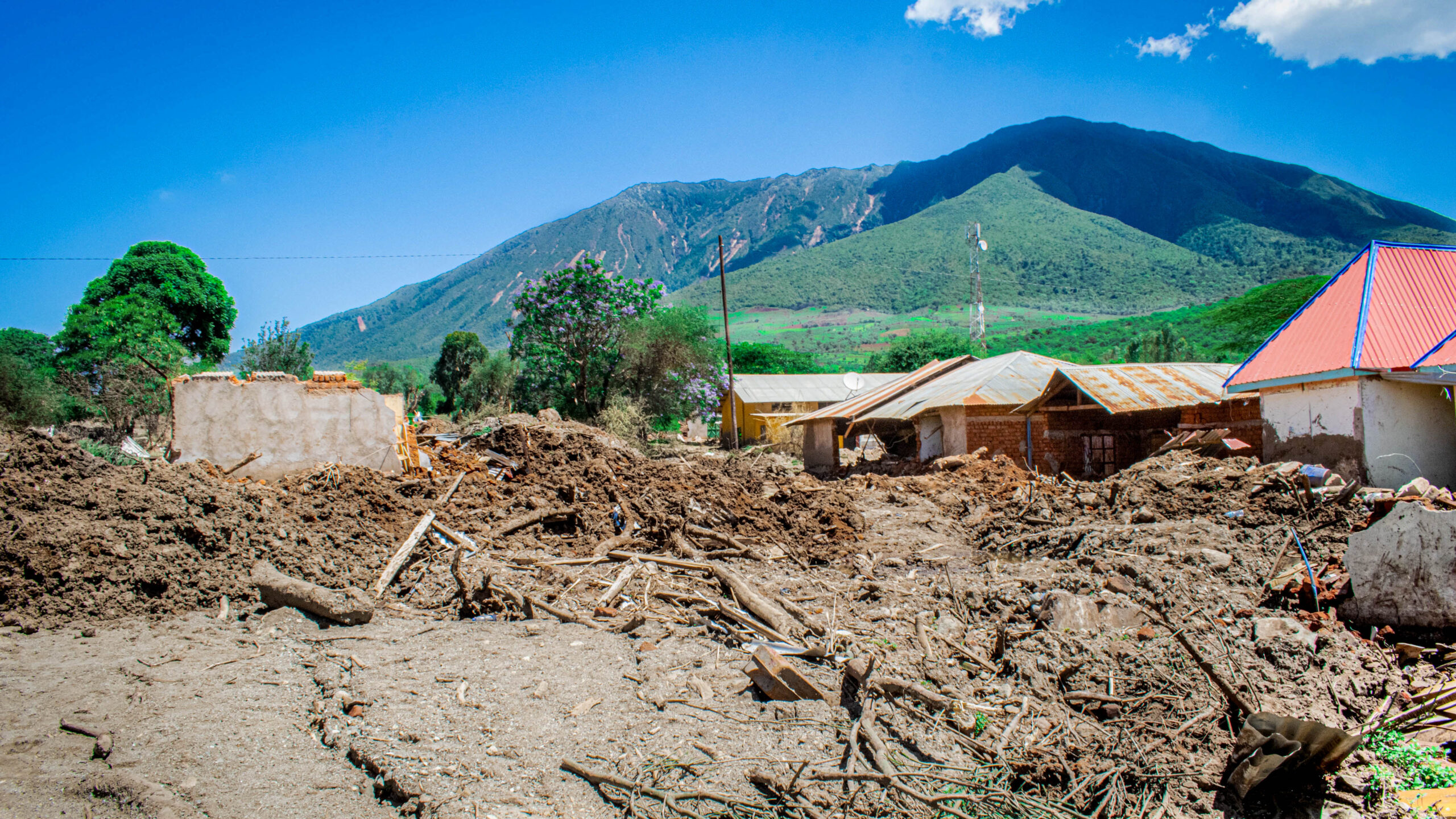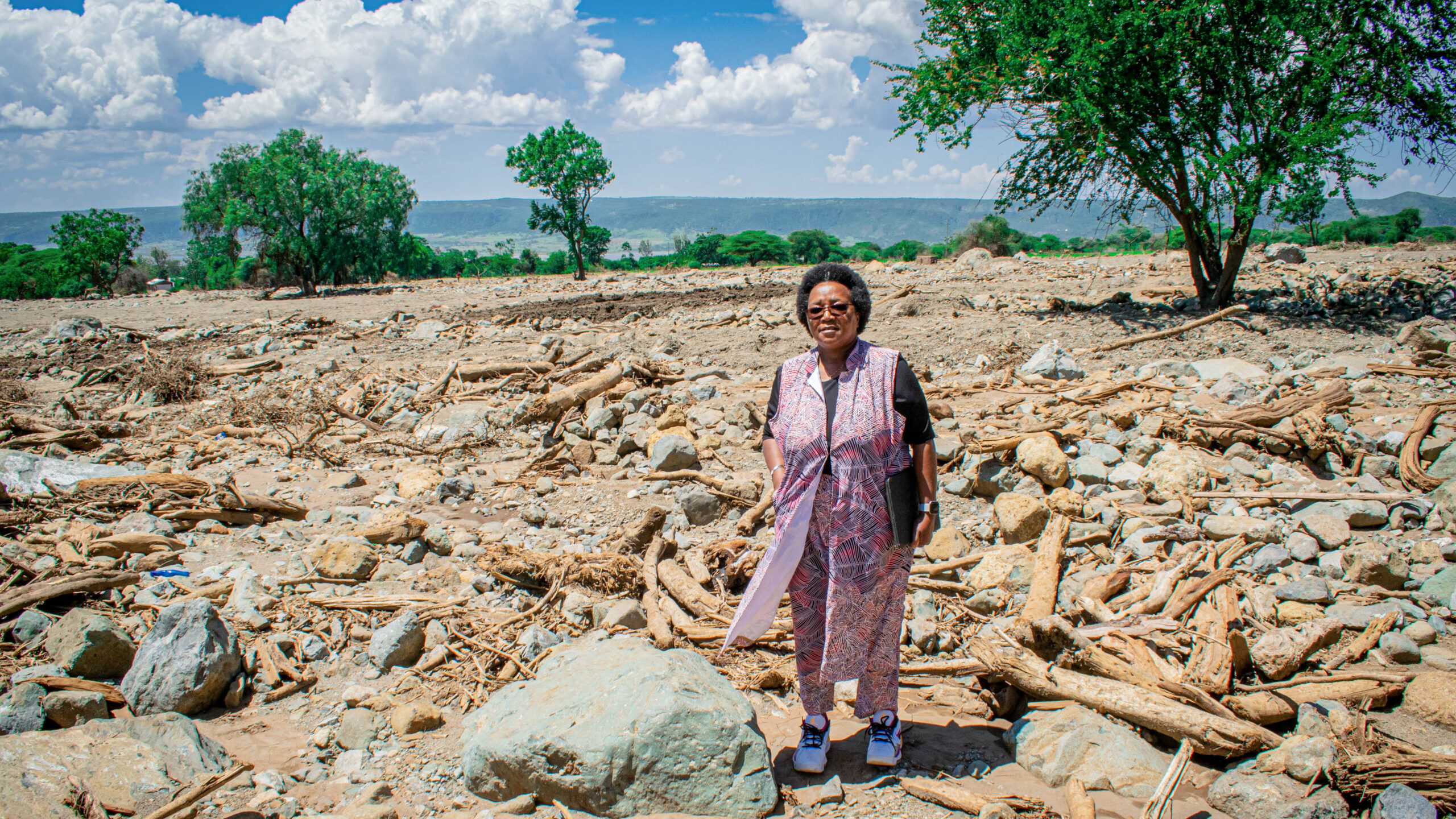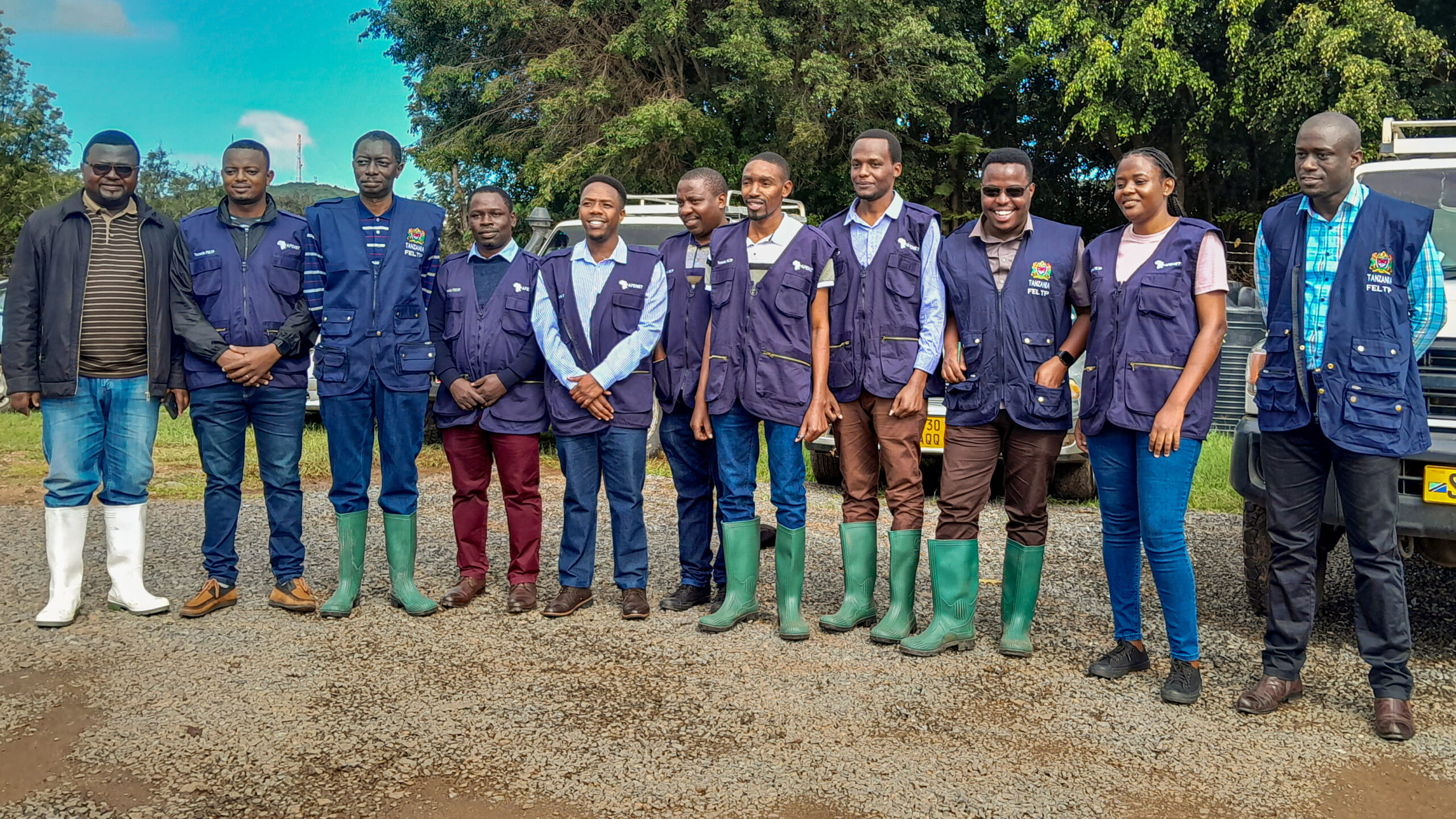Dr. Wangeci Gatei (third from left), director of Global Health Protection Division in CDC Tanzania; Gerald Manase from PORALG (fifth from left); and Suten Mwabulambo, regional health officer (second from right) gather with colleagues from Amref Health Africa in Tanzania and district health authorities as they survey a community in the Hanang District of the Manyara Region in December 2023. Photo courtesy of Amref Health Africa in Tanzania
By Gloria Macha and Allison Maiuri
The Centers for Disease Control and Prevention (CDC) at Mission Tanzania works closely with the Ministry of Health (MOH) and the President’s Office of Regional Administration and Local Government to support programs and workforce capacity development at the national, regional, and district levels. In addition, CDC’s nongovernmental implementing partners support critical health programs and personnel in more than 2,000 government health facilities and communities across the country. With core collaboration centered around engagement through PEPFAR, these partnerships have extended to many areas, including strengthening tuberculosis prevention efforts for people living with HIV, supporting malaria prevention and control through the U.S. President’s Malaria Initiative, and strengthening disease prevention, detection, and response through Global Health Security.
 Rubble piled up by buildings shows the environmental destruction following deadly landslides in the Manyara region of Tanzania in December 2023. Photo courtesy of Amref Health Africa in Tanzania
Rubble piled up by buildings shows the environmental destruction following deadly landslides in the Manyara region of Tanzania in December 2023. Photo courtesy of Amref Health Africa in Tanzania
CDC, in partnership with MOH and the Muhimbili University of Health and Allied Sciences, launched the first advanced Tanzania Field Epidemiology and Laboratory Training Program (FELTP) in 2008. This program aims to mirror the U.S. Epidemic Intelligence Service—a long-standing, globally recognized fellowship program renowned for its investigative and emergency response efforts. In 2015, the U.S. Defense Threat Reduction Agency collaborated with CDC to launch Frontline FELTP, an intense three-month field-based course that trains local disease detectives as the frontline workers to detect and respond to health threats at the local and community levels. When health threats arise, these trained disease detectives investigate and apply their knowledge to keep people from getting sick.
 Dr. Wangeci Gatei, director of the Global Health Protection Division in CDC Tanzania, stands with the debris following flash flooding and deadly mudslides in the Manyara region of Tanzania in December 2023. Photo courtesy of Amref Health Africa in Tanzania
Dr. Wangeci Gatei, director of the Global Health Protection Division in CDC Tanzania, stands with the debris following flash flooding and deadly mudslides in the Manyara region of Tanzania in December 2023. Photo courtesy of Amref Health Africa in Tanzania
Devastating heavy rains in December 2023 triggered deadly flash flooding in the Manyara region of northern Tanzania, destroying more than 1,000 households, displacing 5,600 people, injuring 139 people, and killing 89 people. In addition to the human toll, the floods and landslides caused massive damage to critical infrastructure, including power lines and roads, which accelerated a waterborne disease outbreak. The Tanzania government launched a massive humanitarian response using a multisectoral approach led by the prime minister’s Disaster Management Department in collaboration with the World Health Organization and other partners.
“FELTP residents have proven to be formidable first responders, playing a critical role in mitigating the spread of disease and saving lives in the wake of the catastrophic floods,” said CDC Tanzania Country Director Dr. Mahesh Swaminathan.
Leveraging existing close ties and collaboration with the Ministry of Health, CDC quickly deployed FELTP residents and graduates to ground zero of the emergency response efforts. CDC Tanzania’s Dr. Wangeci Gatei joined FELTP and assisted the Ministry of Health with disease surveillance, detection, and prevention efforts. FELTP conducted rapid sensitization to health care and community healthcare workers in recognition of diarrheal disease and conducted extensive case findings among displaced communities and in 10 health facilities in the affected regions.
 A team of deployed FELTP residents and graduates visit the Manyara region ready to support on the ground emergency response efforts, and assist in disease surveillance, detection, and preventative efforts in December 2023. Photo courtesy of Amref Health Africa in Tanzania
A team of deployed FELTP residents and graduates visit the Manyara region ready to support on the ground emergency response efforts, and assist in disease surveillance, detection, and preventative efforts in December 2023. Photo courtesy of Amref Health Africa in Tanzania
“As frontliners, the program has equipped us with skills to rapidly respond to public health threats by providing technical support and efficient use of data at the locality,” said Dr. George Mrema, an MOH Advanced FELTP graduate.
To enhance disease surveillance, the team developed alerts for action to assist healthcare workers with identifying and reporting cholera and introduced a toll-free number for community reporting.
When a threat was identified, the team worked with community health workers to integrate water, sanitation, and hygiene activities, critical for preventing the spread of disease outbreaks following disaster. Through CDC support, Amref Health Africa Tanzania, a local implementing partner, is working in partnership with national and local health authorities in Tanzania to enhance community-based disease surveillance, install handwashing facilities and clean toilets in four schools throughout the disaster-stricken region, and ensure that the community will be better equipped to withstand future outbreaks of communicable diseases.
Gloria Macha is a health policy analyst at the Centers for Disease Control and Prevention (CDC) in Tanzania. Allison Maiuri is the associate director for policy and communications at CDC Tanzania.
Source link : https://statemag.state.gov/2024/05/0524feat03/
Author :
Publish date : 2024-05-01 04:25:45
Copyright for syndicated content belongs to the linked Source.





